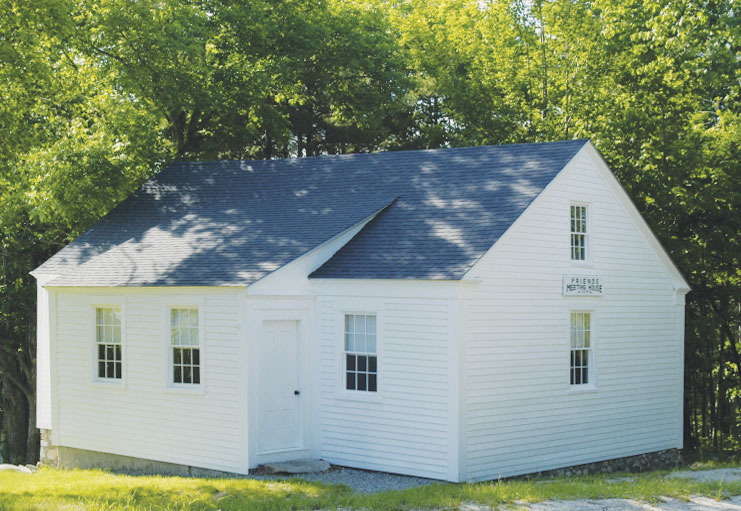The young woman stood outside our meetinghouse staring at our sign. Neatly calligraphed and painted in carefully chosen, muted hues, it read: “Multnomah Monthly Meeting. An unprogrammed congregation of the Religious Society of Friends (Quakers)”. A Friend arriving at the meetinghouse noticed that the young woman seemed perplexed.
“How can I help you?” asked the Friend.
“Well, I was just wondering which Sunday in the month you meet. Is it today?”
Clearly the young seeker knew something of Friends. She knew that “meeting” referred to the congregation or perhaps a worship service. She assumed that the whole of Multnomah County didn’t meet in the modest building each month. Her knowledge of the word “Quaker” must have gone beyond her breakfast cereal. And somehow she had gotten over the odd and ambiguous word “unprogrammed.” Maybe she thought she’d find out about that once she had gotten inside—if only she could figure out when she could enter.
Our meeting had unintentionally put up a barrier, a language barrier, that this seeker was having trouble surmounting. A language barrier normally means a barrier caused by the lack of a shared language. How can we have a “language barrier” when we speak the same language? It’s easy. Talk to a few Friends.
Who is God to you? I once asked a long-time Friend. “Well,” she said without hesitation, “You must start by realizing that God is merely a word.” And what does that three-letter word mean to you? Is the meaning the same?
Time also changes the meaning of words, creating more barriers. Today’s English is very different from the language of early Friends. Context changes the meaning of words. What is your context? And what are your own personal associations with particular religious words?
We have two kinds of Quaker language barriers. There is the external one: the language barrier we pose to non-Quakers like our perplexed young seeker. These are barriers to those who know little or nothing about Friends. “Religious Society,” “monthly meeting,” “unprogrammed congregation” are terms that confound. Then there are the internal barriers: Do we openly and clearly communicate with each other? Do we suffer from an uncharacteristic barrier of silence outside of worship? Do we understand our own Quaker terminology such as “seasoning,” “the Light,” “the Light of Christ?” Is our language dualistic? Do we understand the historic context or theological context of these terms? Is our language confining? Does it keep us from fully exploring who we are? Does it limit our future in a changing world?
External barriers
Consider the sign on your meetinghouse as an outsider might see it. As you do so, realize that you suffer from the curse of knowledge: you presume that others know what you know. They don’t. Assume the beginner’s mind: see the sign as if for the first time; try to forget what you know about Quakers.
The problem with our own meeting sign was that we used the language of our internal Quaker audience in a place where the purpose was to address an external audience of seekers. So now we have a new sign. Does our new one (to the right) work better? Yes and no. Questions remain for the seeker: Who are Friends? Friends of what? Who are Quakers? Unprogrammed Worship?
This all sounds akin to a secret handshake, except our handshake is a secret language. You either know it or you don’t. You are in or you are out. Our language isn’t helping seekers get from outside to inside.
Internal barriers
Is my using the word God the same as your using the word Spirit? If you use Spirit does it leave my God unacknowledged? If you use Spirit, does it speak to my God? Why the difference in words? Is this a barrier to understanding? Is the difference important for us to explore together? Are God and Spirit the same—particularly, and perhaps only, in the silence?
At the recent clerking workshop at Multnomah Friends Meeting, facilitators and experienced clerks Ann Stever and Dorsey Green asked us to share our words for God, Spirit, etc. Here are some we came up with as a group: God, Father, Lord, Spirit, Love, Truth, Creator, Jesus, Mother Grace, Conscience, Light, Holy Spirit, Teacher, Source, Comforter, Ineffable, Allah.
Then Ann and Dorsey asked for words that cause us problems or make us uneasy. Here are a few that were mentioned: Cross, Master, Father, Authority, Savior, The Son, The Way, Lamb, Lord, The Holy Word, A Mighty Fortress, King.
What about the more mundane words that cause us to feel twinges of unease or confusion? Do we, for instance, have shared meanings for these “T” words?: Truth, testimony, tender, threshing session.
How about these terms?: Eldering, holy days/holidays, sense of the meeting, attenders and members? They raise questions: Can a three-year-old elder (recently a toddler reprimanded an adult Friend during worship by whispering “stop squirming”)? Do we really treat Christmas and Easter as just two more holy days? Is there a non-sense (as well as a sense) of the meeting? Might not “participants” suffice for member and attender?
Constraints, bracketing, and defining metaphors
Do unquestioned Quaker terms subtly constrain us? Consider our sharing of Joys and Concerns following meeting for worship. Are these truly the outer parameters of our feelings? They bracket and confine us. What lies beyond these brackets? And is there nothing worth sharing in between? Could there be joy in having a concern; could there be a concern associated with our joy? Do our brackets allow anger, outrage, or our-and-out objection? Do they allow ecstasy, or elation?
Friends, we have many metaphors including: Light and its variations (holding in the Light, Children of the Light, the Light of Christ), center down, hold up, lamb’s war, Spirit-led, clearness, seasoning.
How do these define us? Duality is common in our metaphors. What if duality prevents us from experiencing unity? What if we skipped the duality? Or are we led to find unity through duality? Consider breathing in and out, inhaling and exhaling: together they constitute breathing. They sustain life itself; each is vital to the other. If you do only one (which the body doesn’t allow), you die.
These are a few of our Quaker language barriers. Studying and discussing them will ultimately lift them. A barrier points to its opposite—an opening. By exploring barriers, we discover gateways to better understanding and to fuller experience. Let’s lift the barriers and walk through the gates!




[…] By Douglas C Bennett (who we also interviewed on Youtube). Our June/July special issue looked at faith, practice, and community and asked “What makes us Friends?” It included stories of international bridge building among Friends by Sara Katreen Hoggatt, Nenad Knezevic’s tale of cultivating an amazingly diverse small Quaker community in Serbia, and Rick Seifert’s appeal that we tone down the off-putting Quakerese. […]